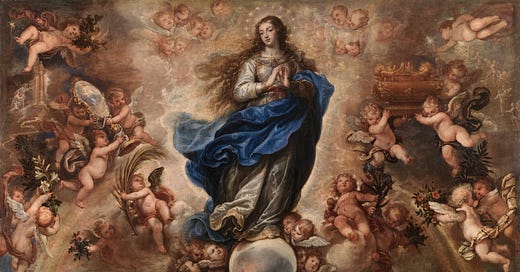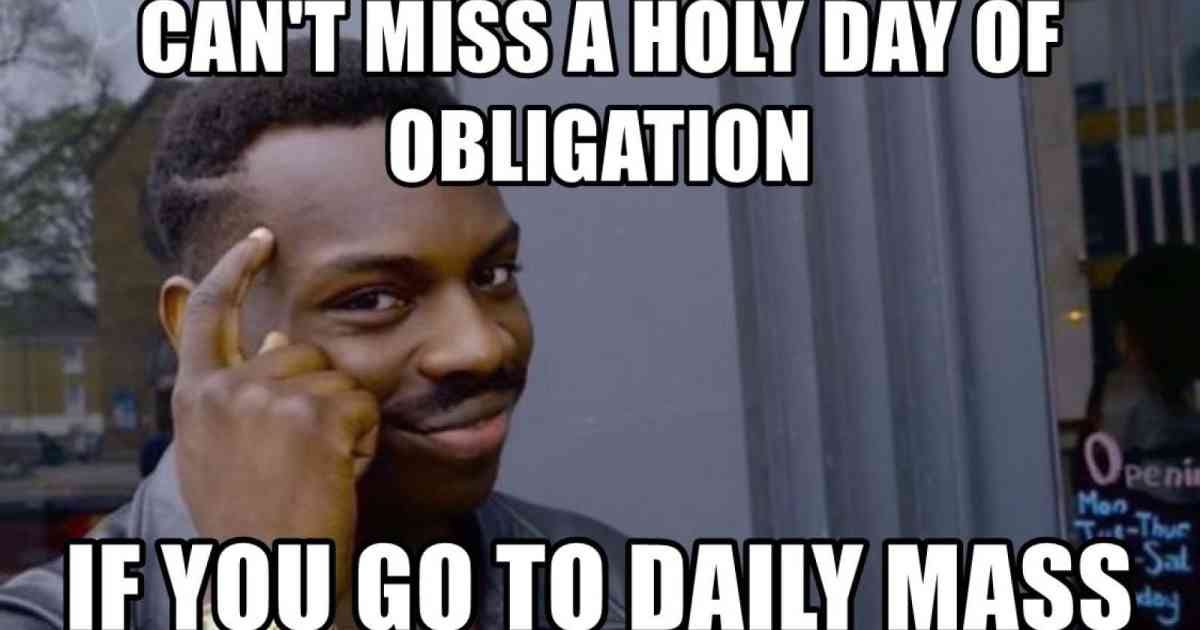The Solemnity of the Immaculate Conception is normally on December 8, but the Second Sunday of Advent supersedes it. Rather than skipping it, the Church moves the observation to today, which means it’s still a holy day of obligation.
Let’s get the obvious out of the way, first—the Immaculate Conception is Mary’s, not Jesus’. The latter would be the Feast of the Annunciation which, confusingly, is the story in today’s Gospel.
Obviously, we don’t worship Mary. Her Immaculate Conception was a gift of grace from God. Still, we can look to Immaculate Mary, awed by her singular privilege, confident that she intercedes for us so that we can share in her holiness, destined “for the praise of his glory.”
Reading I
Gn 3:9-15, 20
After the man, Adam, had eaten of the tree, the LORD God called to the man and asked him, “Where are you?” He answered, “I heard you in the garden; but I was afraid, because I was naked, so I hid myself.” Then he asked, “Who told you that you were naked? You have eaten, then, from the tree of which I had forbidden you to eat!” The man replied, “The woman whom you put here with me she gave me fruit from the tree, and so I ate it.” The LORD God then asked the woman, “Why did you do such a thing?” The woman answered, “The serpent tricked me into it, so I ate it.”
Then the LORD God said to the serpent: “Because you have done this, you shall be banned from all the animals and from all the wild creatures; on your belly shall you crawl, and dirt shall you eat all the days of your life. I will put enmity between you and the woman, and between your offspring and hers; he will strike at your head, while you strike at his heel.”
The man called his wife Eve, because she became the mother of all the living.
A lot of mythologies explain details of everyday life. This passage, for instance, mythologizes the reason why people hate snakes. But does that really need an explanation?
Not really. If that’s all there was to it, this story wouldn’t be so pivotal to both Jewish and Christian theology. This is a story about sin, not snakes.
There are two reasons to include this reading on the Feast of the Immaculate Conception. First, it shows us why we need salvation. Humans are born with original sin, as illustrated by eating the one thing we weren’t supposed to.
But second, it also tells us how the salvation arrives. Because Mary is the second Eve, the new beginning, God’s prophesy tells us that her (Mary’s) offspring will strike at the snake’s (the devil’s) head.
Responsorial Psalm
Ps 98:1, 2-3ab, 3cd-4
R. Sing to the Lord a new song, for he has done marvelous deeds.
Sing to the LORD a new song,
for he has done wondrous deeds;
His right hand has won victory for him,
his holy arm.
R. Sing to the Lord a new song, for he has done marvelous deeds.
The LORD has made his salvation known:
in the sight of the nations he has revealed his justice.
He has remembered his kindness and his faithfulness
toward the house of Israel.
R. Sing to the Lord a new song, for he has done marvelous deeds.
All the ends of the earth have seen
the salvation by our God.
Sing joyfully to the LORD, all you lands;
break into song; sing praise.
R. Sing to the Lord a new song, for he has done marvelous deeds.
This seems to be more about the Annunciation than the Immaculate Conception, but that’s a running theme today. Can’t have one without the other!
Mary is the first person God directly revealed His plan to. As a good Jewish girl, she would’ve read stories like the above about Adam and Eve. I’m sure she was shocked to learn she was the one they’re talking about.
Reading II
Eph 1:3-6, 11-12
Brothers and sisters: Blessed be the God and Father of our Lord Jesus Christ, who has blessed us in Christ with every spiritual blessing in the heavens, as he chose us in him, before the foundation of the world, to be holy and without blemish before him. In love he destined us for adoption to himself through Jesus Christ, in accord with the favor of his will, for the praise of the glory of his grace that he granted us in the beloved.
In him we were also chosen, destined in accord with the purpose of the One who accomplishes all things according to the intention of his will, so that we might exist for the praise of his glory, we who first hoped in Christ.
God has had a plan for all of us, from the beginning. We still have a choice; we may not follow that plan sometimes, but it’s still there.
The difference between us and Mary is that she did follow the plan. God knew she was the one who’d be able to raise His Son to be the Messiah. And when Mary found out, she agreed. She said yes to God’s will.
Alleluia
See Lk 1:28
R. Alleluia, alleluia.
Hail, Mary, full of grace, the Lord is with you;
blessed are you among women.
R. Alleluia, alleluia.
Protestants make fun of Catholics for not knowing their Bible, but we quote Luke 1:28 every time we say the Hail Mary!
And “full of grace” is what today is all about. God offers his grace to all of us, but we, like Adam and Eve, deny it on a regular basis. Mary didn’t, and still doesn’t, as Queen of Heaven.
Gospel
Lk 1:26-38
The angel Gabriel was sent from God to a town of Galilee called Nazareth, to a virgin betrothed to a man named Joseph, of the house of David, and the virgin’s name was Mary. And coming to her, he said, “Hail, full of grace! The Lord is with you.”
But she was greatly troubled at what was said and pondered what sort of greeting this might be. Then the angel said to her, “Do not be afraid, Mary, for you have found favor with God. Behold, you will conceive in your womb and bear a son, and you shall name him Jesus. He will be great and will be called Son of the Most High, and the Lord God will give him the throne of David his father, and he will rule over the house of Jacob forever, and of his Kingdom there will be no end.”
But Mary said to the angel, “How can this be, since I have no relations with a man?”
And the angel said to her in reply, “The Holy Spirit will come upon you, and the power of the Most High will overshadow you. Therefore the child to be born will be called holy, the Son of God. And behold, Elizabeth, your relative, has also conceived a son in her old age, and this is the sixth month for her who was called barren; for nothing will be impossible for God.”
Mary said, “Behold, I am the handmaid of the Lord. May it be done to me according to your word.” Then the angel departed from her.
You ever think about the fact that Mary was a teenager when this happened? No one knows exactly how old she was, but given the traditions of the time, she was probably betrothed around the age of 12 or 13. She would then have continued to live with her parents until the marriage in her mid-teens. (This is why she hadn’t had relations with Joseph.)
Kids today don’t even want to learn how to drive; they’d rather take an Uber. But here’s a little peasant girl in a poor outpost on the edge of an empire, being told she’s going to be responsible for raising the King of Kings. And what does she do? She says yes!
Whatever God’s plan is for us , it can’t be as difficult as that, right? We should follow Mary’s example and say yes to His plan, too.





